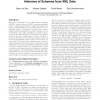Free Online Productivity Tools
i2Speak
i2Symbol
i2OCR
iTex2Img
iWeb2Print
iWeb2Shot
i2Type
iPdf2Split
iPdf2Merge
i2Bopomofo
i2Arabic
i2Style
i2Image
i2PDF
iLatex2Rtf
Sci2ools
153
click to vote
WWW
2008
ACM
2008
ACM
Learning deterministic regular expressions for the inference of schemas from XML data
Inferring an appropriate DTD or XML Schema Definition (XSD) for a given collection of XML documents essentially reduces to learning deterministic regular expressions from sets of positive example words. Unfortunately, there is no algorithm capable of learning the complete class of deterministic regular expressions from positive examples only, as we will show. The regular expressions occurring in practical DTDs and XSDs, however, are such that every alphabet symbol occurs only a small number of times. As such, in practice it suffices to learn the subclass of regular expressions in which each alphabet symbol occurs at most k times, for some small k. We refer to such expressions as k-occurrence regular expressions (k-OREs for short). Motivated by this observation, we provide a probabilistic algorithm that learns k-OREs for increasing values of k, and selects the one that best describes the sample based on a Minimum Description Length argument. The effectiveness of the method is empirical...
Deterministic Regular Expressions | Internet Technology | K-occurrence Regular Expressions | WWW 2008 | XML Schema Definition |
Related Content
| Added | 21 Nov 2009 |
| Updated | 21 Nov 2009 |
| Type | Conference |
| Year | 2008 |
| Where | WWW |
| Authors | Geert Jan Bex, Wouter Gelade, Frank Neven, Stijn Vansummeren |
Comments (0)

